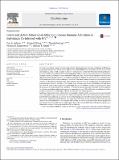| dc.identifier.citation | Sullivan, Zuri A., Emily B. Wong, Thumbi Ndung'u, Victoria O. Kasprowicz, and William R. Bishai. 2015. “Latent and Active Tuberculosis Infection Increase Immune Activation in Individuals Co-Infected with HIV☆☆☆★.” EBioMedicine 2 (4): 334-340. doi:10.1016/j.ebiom.2015.03.005. http://dx.doi.org/10.1016/j.ebiom.2015.03.005. | en |
| dc.description.abstract | In recent years, chronic immune activation and systemic inflammation have emerged as hallmarks of HIV disease progression and mortality. Several studies indicate that soluble inflammatory biomarkers (sCD14, IL-6, IL-8, CRP and hyaluronic acid), as well as surface markers of T-cell activation (CD38, HLA-DR) independently predict progression to AIDS and mortality in HIV-infected individuals. While co-infections have been shown to contribute to immune activation, the impact of latent tuberculosis infection (LTBI), which is widely endemic in the areas most affected by the global AIDS epidemic, has not been evaluated. We hypothesized that both active and latent states of Mycobacterium tuberculosis co-infection contribute to elevated immune activation as measured by these markers. In HIV-infected individuals with active, but not latent TB, we found elevated levels of soluble markers associated with monocyte activation. Interestingly, T-cell activation was elevated individuals with both latent and active TB. These results suggest that in the highly TB- and HIV-endemic settings of southern Africa, latent TB-associated T-cell activation may contribute to HIV disease progression and exacerbate the HIV epidemic. In addition, our findings indicate that aggressive campaigns to treat LTBI in HIV-infected individuals in high-burden countries will not only impact TB rates, but may also slow HIV progression. Significance Latent tuberculosis, which affects an estimated 1/3 of the world's population, has long been thought to be a relatively benign, quiescent state of M. tuberculosis infection. While HIV co-infection is known to exacerbate M. tuberculosis infection and increase the risk of developing active TB, little is known about the potential effect of latent TB infection on HIV disease. This study shows that HIV-infected individuals with both active and latent TB have elevated levels of inflammation and immune activation, biomarkers of HIV disease progression and elevated risk of mortality. These results suggest that, in the context of HIV, latent TB infection may be associated with increased risk of progression to AIDS and mortality. | en |


